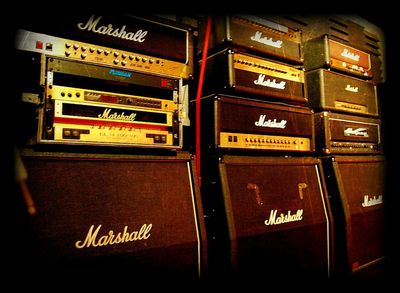
I was speaking with a friend who is a drummer for a touring metal band. He mentioned that the band he plays for recently downscaled their line-up to one guitar from a previous two guitarist unit. They were not sure how the band’s sound was going to be because in theory one less guitar would mean a weaker sound. Upon my friend’s recommendation to have the remaining guitarist play the metal parts with more of a bigger, aggressive, open, rock feel – the guys in the band actually realized that things are sounding pretty good and have so far continued to tour as a four piece.
I thought about that and I realized that another truth of a great guitar tone lies that example.
I consider myself a full-on heavy metal guitarist and have had that exact goal of becoming one from the day I picked up my guitar. However, as I was growing up I developed a taste for all kinds of rock and metal music and enjoyed everything from Whitesnake to Motley Crue to Fates Warning to Loudness to Priest to Megadeth and Slayer. You get the idea. I was scrutinized in High School for that, as many might remember that if you liked real metal you only stuck to a particular band and heavier. Didn’t matter. I thought that was stupid.
I never learned a huge boatload of songs while learning how to play the guitar, but one thing I definitely worked on is hearing the way the guitars sounded in a particular band. I quickly learned to distinguish how Mick Mars from the Crue “hits” the chords versus someone like Akira from Loudness and how the band’s sound changes because of that. I learned how punk inspired aggression works in a band like Slayer and how K.K and Glenn Tipton let their early psychedelic rock roots influence the great sounds on the early Priest albums. My guitar riff bible comes from early Megadeth records where there was just enough precision and attack to make the riffs come alive. Those records really pulled in nearly perfect mix of early Priest like sound into a pissed off, frienzied, machined metal assault. I dug it. It was perfect. You were able to hear the notes, the overtones, the attack while you were allowed some air to enjoy it all.
I think it is a good idea to listen to bands who might not fit into a particular genre you might be into. As I said, I dug uber heavy down-tuned sludge of Carcass, could appreciate the looser Aerosmith inspired riffing and also took good note from Dime’s surgical precision of riffing. I suppose it is about being open to learn lessons from others while you shape your sound.
I might get some heat for this, but I believe the art of great guitar sound is slowly slipping in heavy metal. I think the recording medium is partly to blame and how guitars are edited. All I am really saying is that I do not hear “auras” of guitars like I did on records a while back. You knew which band it was by the sound of their guitar. Maybe it’s me, but I think many might agree. You knew that “Some Heads Are Gonna Roll” was a Judas Priest song even before Rob’s vocals came in. Did anyone question who the band is when they heard the riff and guitar tone in “Walk” by Pantera? Who knows, maybe our uncles felt the same about their music versus the one we grew up on. Whichever decade that might be.
To cap of this blog - I think it is important to listen how bands achieve sounds and how this information can ultimately shape your own tone. All great guitarists have been known to have a solid guitar sound and a particular way they play it or attack the chords. Without getting too technical, you can play metal while injecting good movement in your picking hand to let the notes breathe. Many people try to copy Yngwie’s licks and sound, yet not many realize that the space in between the notes is where the answer might hide. I see many guitarists just “play” chords and hear them come out on the other side through the speakers, but we can do even better that.
I hope you can take the above and see how it can work for you. This is just my observation and I’m simply sharing what I noticed through the years.
Metal For Life.
